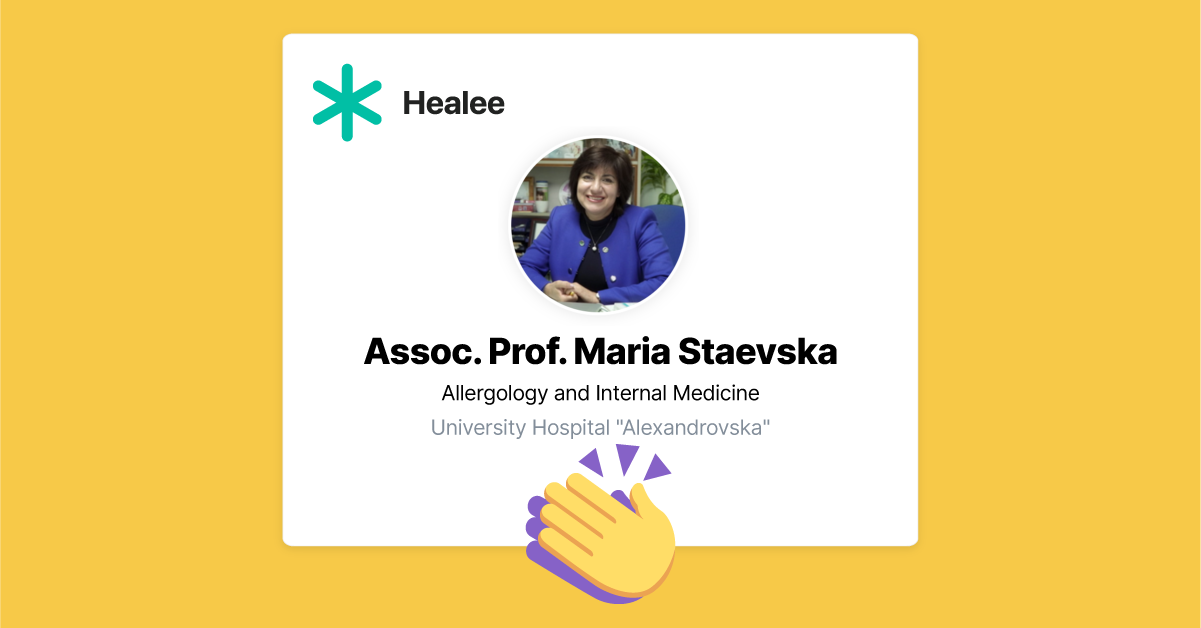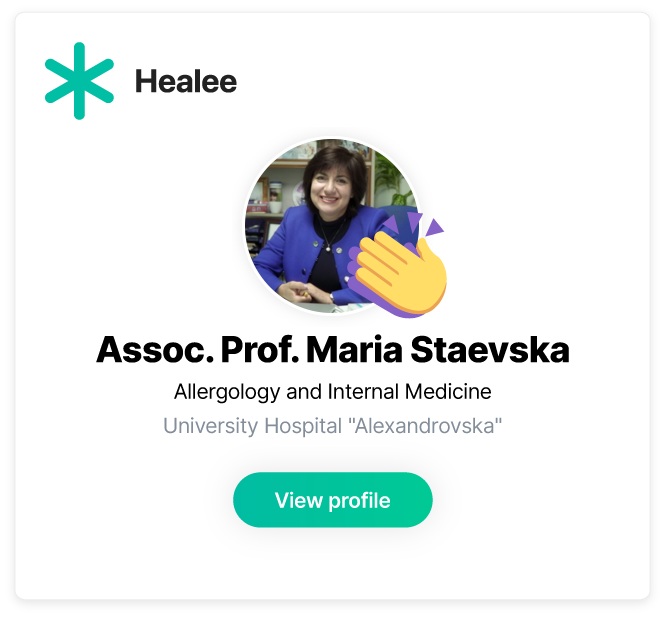
This interview is part of a series of posts: “Best Telemedicine Practice”, where we celebrate all dedicated doctors who are nominated by patients for the best telemedicine practice every month in Healee.
In this interview we introduce to you Assoc. Prof. Maria Staevska – a specialist in Allergology and Internal Medicine, Head of the Department of Allergology at the University Hospital “Alexandrovska” and a member of the Bulgarian Society of Allergology (BDA). She will share her experience with telemedicine, as a natural extension to her practice, as well as share some insights for the National Campaign organized by BDA, Alexandrovska University Hospital and Healee, which involved 30 allergists offering free online consultations through Healee in July.
Assoc. Prof. Staevska graduated from the Higher Medical Institute (which was later renamed to Military Medical University) in Sofia in 1991. She has a degree in internal medicine since 1997 and clinical allergology since 1999. She studied immunogenetics in allergology at the Institut Pasteur, Paris, France and allergology at the Medical University of Besançon, France. In 2013, she received a doctorate in medicine after successfully defending a dissertation in the field of treatment of severe chronic urticaria. Until now she has been working at Alexandrovska Hospital in Sofia, Bulgaria.
Read along to learn what Assoc. Prof. Staevska has to share with us about the campaign in July and also about her personal experience with telemedicine.
Assoc. Prof. Staevska, in July, you launched an initiative offering free telemedicine consultations for patients suffering from allergic rhinitis and urticaria. Will you share how the idea for the initiative was born and what impressions you had from it?
Assoc. Prof. Staevska: As a doctor who uses telemedicine as an аddition to my practice, I believe telemedicine is the future in medicine and it has great potential to accompany doctors in their work and help them deliver high-quality medical care. Of course, telemedicine cannot completely replace everything in medicine, because some conditions require a physical examination and an in-person contact with the patient. But I know from my personal experience that many of the things we (doctors) do in a medical consultation can be done online too. And in a sense, as in other areas of life, this pandemic has accelerated the development of telemedicine worldwide and so very timely came the opportunity to initiate this campaign for free online consultations for people suffering from allergic rhinitis and urticaria.
As the chairman of BDA, I decided that it would be very appropriate now in a pandemic setting to run an online campaign instead of offering patients in-person consultations. My impressions from the campaign are that most of the consultations went smoothly and we really managed to help people by giving them treatment and responding to their condition on time.
Healee really provides many opportunities for a meaningful consultation: good communication options like live chat or a video call, writing a prescription, transfer of various files and images. So most of the things we do during a physical examination, we manage to do them online. What Healee gives doctors is an additional alternative when it comes to distance counseling. We live in a time of Viber, Messenger and other channels through which patients bombard us with questions without thinking that doctors also have personal time with their families. The application is actually a gesture to doctors, because the delicate moment comes just when your patient calls on the phone and asks to be consulted right at this moment, and Healee gives us the advantage to present the platform to patients where we will have all the necessary tools for a meaningful online consultation. In this context, in Healee, doctors see the patient’s files and have all her health data in one place. For example, I receive lab results on my phone in Viber from thousands of patients and it’s hard to remember the information all these people send. Therefore, when they send me some information without a description, it is difficult to put it in context. What I try to explain to patients in such situations is that Healee helps the communication between patients and doctors, because the doctor can view and record the information given by the patient during a consultation, which is not possible in Viber.
What is patients’ initial reaction when you recommend they send lab results via Healee instead of Viber?
Assoc. Prof. Staevska: I personally believe that any consultation where doctors provide expertise and help patients, should be paid. However, if patients prefer not to pay for the second consultation at Healee, I advise them to get a medical referral and make an appointment at the office. In such situations, I sometimes feel like a doorman showing them the way. But I know that Healee provides an alternative that doctors can give to the patient if she does not want to come for a secondary examination in the office.
Do you believe that the free online consultations campaign was successful and whether more patients try telehealth via online consultations during the pandemic?
Assoc. Prof. Staevska: When the PR agency announced the campaign, people heard about Healee and our campaign, and in the beginning a lot of people took advantage of this opportunity. But over time, online consultations became somewhat scarce, and this has shown us that online services are still in their infancy. However, this does not discourage us, because we know that every beginning is difficult. I can say that most successful in the campaign were our pediatricians, because mothers are the ones who browse the Internet the most and look for campaigns like this. Another benefit of this initiative was that my colleagues, who were skeptical about telemedicine at first, were impressed that much of the consultations could be transferred online. And even with these small steps, we know that our efforts are worthwhile.
In one of your interviews with Monitor (a Bulgarian news site) you mentioned that urticaria and allergic rhinitis can also be treated through telemedicine, and patients do not need to come to the office. What allergic conditions can be treated through telemedicine and which ones require a physical examination?
Assoc. Prof. Staevska: Many of the diseases we encounter in allergology can be addressed online. I remember my first online consultation during the big quarantine. A woman from Plovdiv with chronic urticaria, contacted me through Healee where we first had an audio call and then a video conversation. After she showed me the tests I recommended, I was able to offer treatment for her condition. If it weren’t for Healee, this woman wouldn’t have found a solution to her problem. Urticaria is another example of a medical condition with symptoms that appear and disappear every now and then, and very often when patients come for an in-person examination they do not have the rash. Healee is where I ask patients to send me a picture as soon as the rash appears so that I can have a closer look. So all diseases that are associated with skin manifestations can be quite successfully consulted through Healee. Allergic rhinitis (hay fever) can also be largely consulted online. It is a bit more complicated with bronchial asthma, where you have to do a breath test and listen to the patient’s breathing, but again, as a start, if the patient gives you the symptoms this tells us that it is asthma. Of course, you can always start with an online consultation and then decide if the patient needs to be hospitalized.
You mentioned that telemedicine is still in its infancy, but while it is bold to predict what the future of telemedicine holds for allergology, what do you think its potential for further development is, and what advice would you give to allergists who are reluctant to accept telemedicine?
Assoc. Prof. Staevska: It surprised me that 15 out of 30 colleagues of mine refused to take part in a campaign for the Day of Urticaria (which is one of the most suitable for telemedicine consultations) when I suggested it recently. I cannot agree that there are no cases in which medical diagnoses cannot be made through telemedicine. We need to work towards teaching doctors to accept telemedicine in the technological era we live in. But as one Jewish phrase states, “New things are not accepted by old people, and new ideas are only accepted by young people.” It is good that young people are accepting the new advances, and without being overly optimistic that colleagues my age will immediately embrace telemedicine, our experience with this campaign shows that it is not impossible. I was impressed that on the European Allergology Congress in June, which took place online, a dermatologist at the European Academy of Allergology said in an interview that her hospital had already converted almost 90% of their consultations online, and our vision for the future after COVID is that at least 50% of our consultations will be online. The COVID pandemic has accelerated this process and I think this is the revolutionary step we need to take, especially now that there are already platforms offering these services.
Thank you for your time and comprehensive answers! Finally, is there anything else you think other allergists should know about telemedicine that you would like to share with your experience with Healee?
Assoc. Prof. Staevska: Healee has the potential to turn new patients into loyal patients and help you affirm your relationship with your current patients. In the future, I hope that all this patient data that is available in Healee, can be linked to the healthcare system and more doctors would give telemedicine a chance. I am convinced that this is the way we should go and I hope to see telemedicine grow even more.
